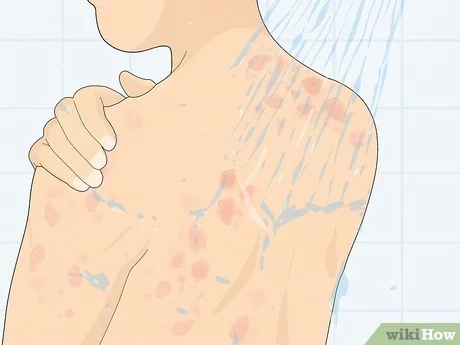Scalp psoriasis is a chronic inflammatory skin condition characterized by the rapid growth of skin cells on the scalp, leading to the formation of thick, silvery scales, redness, and sometimes bleeding. Unlike other common scalp conditions such as dandruff or seborrheic dermatitis, scalp psoriasis is an autoimmune disorder, where the immune system mistakenly attacks healthy skin cells, accelerating their production. This condition can range from mild, with slight scaling, to severe, with thick, crusted plaques covering the scalp.
SEE ALSO: What Causes Psoriasis Flare-Ups?
The Importance of Seeing a Dermatologist:
While it might be tempting to self-diagnose and treat scalp psoriasis with over-the-counter products or home remedies, it is crucial to seek the guidance of a dermatologist. Scalp psoriasis can resemble other scalp conditions, making accurate diagnosis challenging. A dermatologist can provide a tailored treatment plan that addresses the specific type and severity of psoriasis, reducing the risk of complications or worsening of symptoms.
Understanding Scalp Psoriasis:
Causes:
The exact cause of scalp psoriasis is not entirely understood, but it is believed to result from a combination of genetic and environmental factors. Individuals with a family history of psoriasis are at a higher risk of developing the condition. Immune system dysfunction plays a central role, with the body’s immune cells attacking healthy skin cells as if they were a threat. Environmental triggers such as stress, skin injuries, infections, and certain medications can also exacerbate or trigger scalp psoriasis.
Symptoms:
Common symptoms of scalp psoriasis include:
Scaling: The formation of thick, white or silvery scales on the scalp.
Flaking: Similar to dandruff, but with larger, more defined flakes.
Itching: Ranging from mild to severe, the itching can lead to scratching, which may cause bleeding or worsen the condition.
Redness and Inflammation: The scalp often appears red and inflamed, especially around the hairline.
Dryness: The affected areas can become extremely dry, leading to cracks and further discomfort.
Types:
Scalp psoriasis can manifest in several forms:
Plaque Psoriasis: The most common type, characterized by raised, red patches covered with silvery-white scales.
Pustular Psoriasis: Less common, this type involves the appearance of pus-filled blisters surrounded by red skin.
Erythrodermic Psoriasis: A rare but severe form that can cover large areas of the scalp with redness and scaling, often accompanied by intense itching and pain.
Treatment Options:
Medical Treatments:
Topical treatments are often the first line of defense against scalp psoriasis. Common options include:
Corticosteroids: These anti-inflammatory medications reduce redness, swelling, and itching. They come in various forms, including creams, ointments, and shampoos.
Vitamin D Analogs: Medications like calcipotriene (Dovonex) slow down the production of skin cells and reduce scaling.
Salicylic Acid: This keratolytic agent helps soften and remove scales, making it easier for other medications to penetrate the skin.
Coal Tar: An older treatment, coal tar shampoos and solutions help reduce scaling, itching, and inflammation.
Phototherapy:
Ultraviolet (UV) light therapy can be an effective treatment for moderate to severe scalp psoriasis. Narrowband UVB and excimer laser are common methods. These therapies help slow the rapid growth of skin cells and reduce inflammation.
Oral Medications:
For more severe cases, systemic treatments may be necessary. These include:
Methotrexate: A powerful medication that suppresses the immune system to reduce inflammation.
Cyclosporine: Another immunosuppressant that can be effective for severe psoriasis.
Biologics: These are newer drugs that target specific parts of the immune system, such as TNF-alpha inhibitors (e.g., adalimumab) and IL-17 inhibitors (e.g., secukinumab).
Home Remedies:
Cautionary Note:
While some home remedies can provide temporary relief, they should not replace medical treatments or be used without consulting a dermatologist.
Apple Cider Vinegar: Diluted apple cider vinegar can be applied to the scalp to reduce itching and inflammation.
Tea Tree Oil: Known for its anti-inflammatory and antiseptic properties, tea tree oil can help reduce symptoms, but it should be used with caution as it may cause irritation in some people.
Aloe Vera: Aloe vera gel can soothe the scalp and reduce redness and scaling.
Key Points
A dermatologist is essential in diagnosing the exact type of scalp psoriasis and recommending the most effective treatment options. Misdiagnosis can lead to ineffective treatment and worsening of the condition.
Lifestyle Changes:
Incorporating a healthy diet, managing stress, and avoiding known triggers can play a significant role in managing scalp psoriasis. Foods rich in anti-inflammatory properties, like omega-3 fatty acids, may help reduce symptoms.
Sun Protection:
While limited sun exposure can benefit psoriasis, it is essential to protect the scalp from excessive UV rays, especially during phototherapy, to prevent sunburn and potential skin damage.
Hair Care:
During treatment, it’s crucial to use gentle shampoos and conditioners. Avoiding harsh styling products and tools can help reduce irritation and promote healing.
Conclusion
Treating scalp psoriasis effectively requires a comprehensive understanding of the condition and the available treatment options. There is no one-size-fits-all solution, as the best medicine for scalp psoriasis depends on several factors, including the severity of the condition, patient tolerance, and specific symptoms. Topical treatments, such as corticosteroids and medicated shampoos, remain the first line of defense for many patients due to their targeted approach and ability to reduce inflammation and scaling directly at the source. However, for those with more severe or resistant cases of scalp psoriasis, systemic treatments, including biologics and oral medications, may be necessary to control the condition from within.
Related Topics:



























